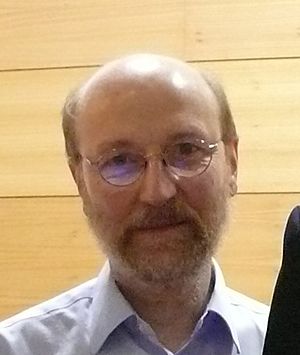Julian Lewis (biologist) facts for kids
Quick facts for kids
Julian Lewis
|
|
|---|---|

in 2008
|
|
| Born | 12 August 1946 |
| Died | 30 April 2014 (aged 67) |
| Alma mater | Balliol College University of Oxford |
| Known for |
|
| Scientific career | |
| Institutions | Cancer Research UK |
Julian Hart Lewis (born August 12, 1946 – died April 30, 2014) was an English scientist. He was a developmental biologist, which means he studied how living things grow and develop. His research helped us understand how cells know when to do things. He also studied how cells communicate with each other.
Lewis showed that a special molecule, called a Notch ligand, helps control when nerve cells become specialized. He also studied how cells create regular patterns in a developing body. This helped explain how animals develop different body parts.
Contents
Early Life and Education
Julian Lewis went to Balliol College, Oxford, starting in 1964. This is a famous college at the University of Oxford in England. He studied there to become a scientist.
Important Discoveries
Lewis was very interested in how cells keep time. He found out that cells have their own internal clocks. These clocks help them decide when to grow or change.
He also studied something called the Notch signaling pathway. This is like a secret language that cells use to talk to each other. This communication is super important for how bodies develop. For example, it helps nerve cells form correctly.
Lewis also looked at how bodies form in repeating sections. Think about how a worm's body has many similar segments. He figured out how cells create these patterns. He showed that tiny delays in cell signals help set the rhythm for these patterns.
Awards and Recognition
Julian Lewis received several important awards for his work.
- In 2003, he was given the Waddington Medal. This award is from the British Society for Developmental Biology.
- In 2005, he became a member of the European Molecular Biology Organization. This is a group of top scientists in Europe.
- In 2012, he was made a Fellow of the Royal Society. This is a very high honor for scientists in the United Kingdom.
Working Life and Textbooks
Julian Lewis led a research team at Cancer Research UK's London Research Institute. This is a place where scientists study cancer.
He also helped write two very popular biology textbooks. These books are called Molecular Biology of The Cell and Essential Cell Biology. Many students around the world use these books to learn about cells.
Later Life
Julian Lewis passed away in April 2014. He had been living with prostate cancer for ten years. His work greatly helped our understanding of how living things develop.

